How to choose the best medical alert system for your needs
Learn how to find the best safety net for you or your senior loved one
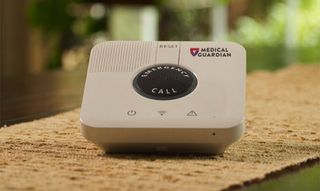
ConsumerAffairs reports that the medical alert industry is expected to grow by over 68-percent in the next five years as the Boomer generation ages into retirement, in part because of the coronavirus pandemic.
Seniors want to feel the peace of mind that they can call for help and get it, even if there is a pandemic. And perhaps more importantly, seniors want to maintain their independence so they can stay away from nursing homes and other care facilities where viruses spread.
With such a growing attention on medical alert systems, we've put together an article that answers all of the most common questions about medical alert systems, the call centers, and the companies that sell them to help you choose the right medical alert system for yourself or for your loved one.
Frequently asked questions: medical alert systems
What is a medical alert system?
A medical alert system is any device designed to call for help when you’re experiencing a medical emergency. Traditional medical alert systems consist of a wearable pendant and a base station that connects to your phone line. But more modern systems are built into mobile devices and smartwatches. And while most medical alert systems require you to press a button when you need help, some new technology monitors your vitals continuously and calls for help automatically when a health emergency is about to occur.
How do medical alert systems preserve independence?
Consider the following facts from the Center for Disease Control and Prevention:
Falling is perhaps the greatest threat to a senior, having long-term impacts on both physical and mental health. With that in mind, a quick response to the emergency is the best way to mitigate these statistics. As such, a medical alert system is a safety net. It provides your senior loved one with the ability to call for help with the simple push of a button.
According to AARP, 87 percent of seniors want to stay in their homes as long as possible. Independence is among the most important factors in a senior's quality of life, and a medical alert system help make this happen.
How do medical alert systems work?
The process is simple:
If you don’t need an ambulance, then the operator can call a neighbor or a family member to help you. But if the operator can’t hear you, they will assume the worst and call your local emergency responders.
What is a base unit?
Are you a pro? Subscribe to our newsletter
Sign up to the TechRadar Pro newsletter to get all the top news, opinion, features and guidance your business needs to succeed!
The base unit is often referred to as the base station or home station. It can be confusing when a company refers to it in several different ways. What they are referring to is the core of a traditional or in-home medical alert system. Technologically, the base unit is no more than a speakerphone that only calls one number. It either plugs into a landline or connects to a cellular network.
The pendant, worn around the neck, communicates wirelessly with the base station. So when you press the button, the base station calls for help, even when you’re several rooms away.
All base units feature backup batteries that should last up to two days in case of a black out. Some base units include a clock and room temperature on an LCD display.
What is a pendant?
Worn around your neck, the pendant is essentially a help button that you wear, even when showering. Especially when showering, as the shower is the riskiest place in your home for a fall. As such, every pendant on the market that we've seen is waterproof. When you need help, press the button and it sends a wireless signal to the base station.
What is the wireless range of an emergency pendant?
It depends on the medical alert system, but most pendants range between 600 and 1,200 feet. Both are more than enough range for most homes and apartments. Plus the wireless signal is reliable, even when pressed underwater, which we tested.
Do I have to wear the pendant all the time?
While you can certainly choose to take the pendant off, it’s best to wear at all times. As mentioned, the pendants are waterproof, so wearing it in the shower is expected. That said, many seniors are concerned with the stigma of a medical alert system and often don’t wear their devices. Fortunately, some companies are offering medical alert smartwatches, which don’t look anything like a medical alert system.
Are the pendants waterproof?
We've tested the waterproof capabilities of every pendant on the market. And every single one immediately called for help while submerged under water, even as the base station was several rooms away. So, yes, wireless pendants are waterproof, at least in terms of taking a shower, bath, or swimming.
How reliable are the pendants?
Over the years, as we’ve tested medical alert systems, we've repeatedly tried to find fault with the wireless reliability of the pendants. We thought maybe refrigerators and other appliances would get in the way. Nope. We thought multiple walls would block the signal. Nope. We thought elevation might interfere. Not that either. All-in-all, we’ve never come across a pendant that wasn’t reliable. The one exception is fall detection pendants, which are wildly inaccurate. The wireless single on these pendants, however, is just as reliable as any pendant, so long as you press the help button.
What does "PERS" mean?
PERS is an industry shorthand for "personal emergency response system."
What is a mobile medical alert device?
A mobile medical alert system combines the wireless pendant and the base unit of an in-home system and puts it into one device you wear around your neck. Since it connects to a cellular network, a mobile PERS device goes wherever you go. And if you need help, the operator is right there with you.
The best mobile medical alert systems include GPS, allowing emergency responders to pinpoint your location. And when every second matters in an emergency, this sort of feature is very valuable.
What is the best system for my loved one?
If you can afford it (and you probably can if you choose the Lively Mobile, then a mobile GPS medical alert system is the best option. It provides easy communication. It goes wherever your loved one goes. And it virtually eliminates the risk of a false alert turning into an embarrassing situation.
It really depends on your budget, activity level and location. Check out our article on the subject: What Type of Medical Alert System Is Best for You? Pros and Cons.
How do fall-detection pendants work? Are they worth it?
Fall-detection pendants work by using accelerometers to measure g-forces and a gyroscope to measure the rotation or twist of the body as it goes down. These sensors work in conjunction with proprietary algorithms to determine whether you're falling or simply sitting down quickly or rolling over in bed. The good news is that they do work – in the sense that the pendants can recognize a fall and call for help without requiring you to press the button. The bad news is that they can often be much too sensitive, causing many false alerts.
Simply moving the fall-detection pendants around caused many false alerts in our tests. Many of these pendants consistently activated after being dropped from a mere 6 inches; others barely activated at all, regardless of how hard or soft we fell. And we did fall.
Still, whether it's worth it depends on you and your budget. A fall-detection pendant is designed for scenarios where the user is unconscious and unable to press the button. So it does provide some peace of mind, which is valuable. However, the pendant adds between $5 and $10 a month to your medical alert system cost.
Types of medical alert systems
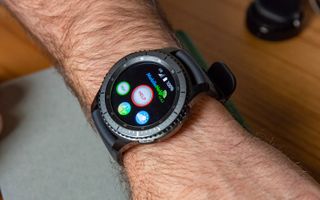
In-home medical alert system
This is the traditional PERS device - it consists of a base unit and a wireless pendant. The base unit is, in the most basic terms, a speakerphone that calls one phone number. When you push the button on the wireless pendant, the pendant sends a signal to the base unit and activates a “call for help.” The wireless pendants are waterproof and typically have a range between 300 and 2,000 feet.
There are two types of in-home systems: landline and cellular. The landline systems are the most affordable, but they require you have a telephone landline. The cellular option includes more up-to-date base units that connect to a cellular network. However, cellular networks can be unreliable in some homes, so it’s important to understand the carrier that the service uses and how well the coverage is in your area.
Mobile medical alert system
If a classic medical alert system is basically a speakerphone that calls one number, then a mobile medical alert system is like a cellphone that calls just one number. It’s like having the base unit installed into the wireless pendant, making for better communication, GPS tracking to help EMT’s find you faster, and less chance of false alerts.
Medical alert smartwatches
New to the industry, medical alert smartwatches are not common yet, but they might gain popularity as seniors become more familiar with smart technology. The medical alert smartwatch provides the same mobile safety net of a mobile medical alert system, but condenses it into a watch, which can have additional apps and features not included with a standard PERS device, such as heart rate monitoring, weather forecasts, text messaging.
Medical alert smartwatches eliminate the stigma of medical alert devices because it looks and acts just like a watch. This means your senior loved one is more likely to wear and use it. That said, if they aren’t familiar with smartphones, they aren’t going to find a smartwatch easy to use.
Medical alert apps
There are lots of medical alert apps. These are cost-effective ways to get help, track activity, monitor health, and more. Typically, the app puts a large “button” on your phone’s home screen, allowing you to call an emergency response center without unlocking your phone.
Medical alert tracking systems
A medical alert tracking system is a standard medical alert system with activity tracking tied into it. The activity tracking, which uses motion detectors, is combined with software to track the activity levels of the senior loved one.
Questions to answer before you buy

We've spent years researching, reviewing, and testing medical alert systems. We've learned that if you don’t want to regret your purchase decision, these are the questions you need to ask before you buy. Whether you’re buying one for yourself or a loved one, it’s important to be honest about how you answer these questions.
Are you (or your loved one) willing to wear it?
The stigma of a medical alert system is real. Many seniors refuse to wear their pendant or mobile medical alert system because they think it makes them look frail or weak. If you’re not going to wear the device, it won’t help you when you need it.
If the stigma concerns you, look into a medical alert smartwatch. These don’t look or feel like a medical alert device, but provide all the same benefits.
Will you press the help button if you need help?
It may seem counter-intuitive, but many seniors are afraid to push the help button when they’ve fallen or need help. While there are a variety of reasons for this, the most common one is the fear that calling for help means their family will put them in a nursing home. In other words, they don’t push the help button in fear that they’ll lose their independence.
There is also something called 911 anxiety. Most of us are conditioned to think it’s not okay to call 911 unless it’s a real emergency. This anxiety extends to the emergency call centers. Many seniors avoid pressing the help button because they’ve fallen but aren’t hurt and only need help getting back up. Most medical alert services encourage seniors to test their systems regularly. This ensures that the system works properly, but it also eases the anxiety of calling an emergency helpline, so when they need help, they don’t hesitate.
Will you remember to wear it — or charge it if necessary?
If you use a mobile medical alert system, you need to charge it every night or every few days. Is this something you can remember to do regularly? And if your loved one has dementia, who is going to help them remember to wear their pendant?
Are there no-cost or low-cost options instead of a medical alert system?
The cheapest option is a smartphone. Androids and iPhones both have emergency call features that can be added to the home screen. It allows you to call 911 by pressing a button and it doesn’t cost a thing. However, it’s important to remember that a smartphone may not be at hand when you have an emergency. If you fall down the stairs, your phone might be up stairs in your purse.
If you’re not sure you want a medical alert system, here are some ways you can minimize the risk of a fall:
Can you afford a medical alert system?
Most retired seniors live on a strict budget. So cost is a big deal. With the most basic packages, you can expect to pay around $20 to $30 per month. But if you want fall detection, mobile systems, and other add-ons, you can expect to pay up to $80 per month.
Do you have a reliable signal and reception?
If you are choosing a cellular in-home system or a mobile medical alert system, does your home have dead spots? Make sure you ask about the cellular provider and see if the coverage is good in your area. Otherwise you could call for help and lack a signal.
Will you be able to keep track of the billing cycles for a medical alert device?
One of the most common complaints we found with medical alert services is the recurring payments. Many seniors aren’t aware that the payments are automatically deducted from their account, causing them to mess up their budgeting.
Unless you choose Life Alert (which requires a 3 year contract), you don’t have to worry about being locked into a contract. That said, the no-contract subscription typically requires you to auto-pay in monthly, quarterly, semiannual or annual payments. You need to be able to manage recurring payments so you don’t undo your budget.
Is a longer-term plan really a better deal?
With most services, you’ll save around $4 per month if you pay annually rather than monthly. The downside is if you cancel before the annual payment runs its course, the service may not provide a prorated refund. It really depends on the policies.
Does the medical alert company you are considering have policies that are truly "senior-friendly"?
It’s important to read the company’s terms and conditions. We know this is something everyone says about “terms and conditions,” but you can’t just assume a medical alert service is senior friendly because they offer a service to seniors. Remember, these companies are looking to make a profit and many take advantage of that. For example, if you cancel your subscription, the cancellation date might begin on the date the company receives the equipment, inspects it, and deems it to be in good condition. If it’s not in good condition, their policy might say they can bill you between $350 and $500. Hardly senior-friendly.
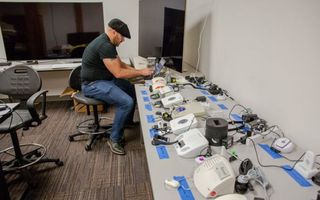
Frequently asked questions: the emergency call center
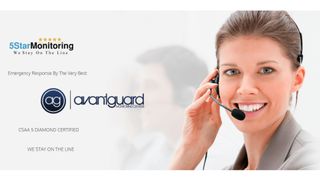
Do medical alert companies own and operate their emergency-response call centers?
Most medical alert companies do not own or operate the call centers featured prominently in marketing materials. In reality, the call centers are independently owned and operated, often with several medical alert services at once. However, this is not made clear by most companies, as they want you to think they are as much responsible for the emergency operator’s training as they are for the medical alert system they sold you.
However, some medical alert services, like Medical Care Alert, either become stakeholders in a call center or make partnerships with call centers that give them some control and say over training.
Of course, some companies, like LifeAlert, Lively, and ADT, do own their call centers. But these companies are rare.
Should I choose a medical alert service who owns and operates its call center rather than a service that outsources it?
Since most medical alert services outsource the call centers, it’s more important to find a service that uses a call center based in your country. Ask about the call center and then research its credentials and awards. Since most medical alert services aren’t transparent about the call centers they are contracted with, this can be difficult. Often, it takes some sleuthing because the service won’t tell you or they’ll try to imply that they own it. For example, a service might say “their” call center won the Central Station Alarm Association’s call center of the year award. You can easily visit the association and see the winners.
That said, there might be some correlation between a call center owning their call center and the speed of their call response. For example, Lively owns and operates its 5Star call center. And every time we’ve tested call response times, Lively has been the fastest by a significant margin. One explanation, given to me by James Leper (CEO for Medical Care Alert) is that independent call centers take calls from home security systems and other services. This means the calls are answered in order of priority by a computer. This adds seconds to a call response time, if not minutes.
That said, a large independently owned and operated call center, like the ones recognized by the Central Station Alarm Association, often have better training, greater access to foreign language speakers, and sufficient contingency plans to ensure your call is always answered. So, choosing a service partnered with an independent call center is not necessarily a bad omen.
Do call centers accommodate foreign languages?
Every call center that we’ve researched in the United States accommodates at least English and Spanish. Most claim to accommodate over 200 languages. That said, we’ve never seen the list of languages and we’ve never tested it. If you have a specific language need for your senior loved one, we recommend asking the service if their call center has operators capable of speaking the language. Then, make sure your loved one routinely tests the medical alert system to ensure that the operator who answers speaks the designated language.
What are the risks that an emergency call will go unanswered?
In all the tests we’ve performed over the years, we’ve pushed the help button on a medical alert system well over 1,000 times. And we’ve had just three instances where nobody answered. One instance resulted in the medical alert system calling a number that was no longer in use. We were met with a computerized voice that requested we call a specific phone number. However, the message would always end and repeat before the number was completed.
The other two instances were with the same medical alert service. The call simply went unanswered for over five minutes before we ended the call. After talking with the company who supplied the device, we determined that there was an issue with the device.
Aside from that, there is virtually no risk that an emergency call will go unanswered. Every call center should have contingencies in place should the power go out in their facilities. And they all operate at all hours, on all days throughout the year.
How are call-center operators trained?
Operators typically receive the same or similar training as EMTs and are trained to meet 911-operator standards.
What happens if the operator can't hear me?
The base units have very sensitive microphones that are supposed to pick up your voice from other rooms in your home, but that doesn't mean they are always effective in picking up what you're saying. If operators can't communicate effectively with you to assess the emergency, they will assume you need help and will contact your local emergency responders.
Even if you try to cancel an emergency call by hitting the reset button on the base unit, an operator will call your home or cellphone to make sure you are fine. (This happened dozens of times throughout our testing.)
Do I have to worry about false alerts?
It depends. False alerts happen a lot, especially with fall detection pendants. When a false alert happens, you simply need to tell the operator that you’re fine and you don’t need help.
False alerts become an issue when you can’t communicate this to the emergency operator. For example, if you’re out in your backyard working in the garden and your fall detection pendant calls for help, you are probably too far away from the base station to hear the operator or know that a call has been placed. And if the operator can’t hear you, they will send an ambulance to your home. If this happens, the emergency responders will almost definitely take you to the hospital, even if you refuse, to save them from potential legal issues.
So, if your mobility permits you to work in the yard, consider a mobile medical alert system where you can easily communicate with operators if a false alert happens.
Frequently asked questions: the medical alert company
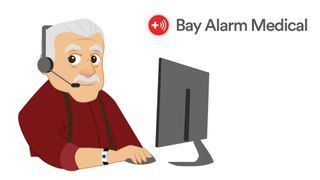
Why are so many medical alert companies so similar?
Most medical alert services use either the MyTrex MXD3G medical alert system or the MobileHelp CBS2-01. Even the mobile PERS devices are mostly the same. Many services are even contracted with the same emergency call centers. (In one round of testing, the same operator answered calls on medical alert systems from three separate services.)
In essence, most medical alert services buy their equipment from a manufacturer and lease it to customers. And they contract out the call center. So they are essentially just setting the price, selling the service, putting their brand on a system.
What packages are typically offered?
Most services offer three basic packages with optional add-ons.
Add-ons:
What is a lockbox? Is it worth it to add the lockbox to my checkout?
A lockbox holds a spare key for emergency responders to use to get in your house. If you experience an emergency and you don’t have one, the EMTs will forcibly enter the home. If you don’t want to damage a door or window, get a lockbox and give the pass code to the service.
Can I cancel at any time?
Most medical alert services allow you to cancel at any time, with Life Alert being the exception.
What are the refund policies like?
It differs from company to company. Most provide a full refund if you cancel and return your equipment within a specific period, usually between 15 and 90 days. After that, your refund is usually prorated. However, the refund policies are often difficult to obtain (on purpose) and require written cancellations.
Read more about medical alert systems
- The best medical alert systems
- How we test medical alert systems
Jeph Preece is an ambitiously creative writer, editor, and content strategist with over seven years of digital publishing experience and five years teaching and admin experience in academia. He is specialized in short-form and long-form, purpose-driven content. Jeph is also an accomplished artist, musician, and author of innovative fiction.

